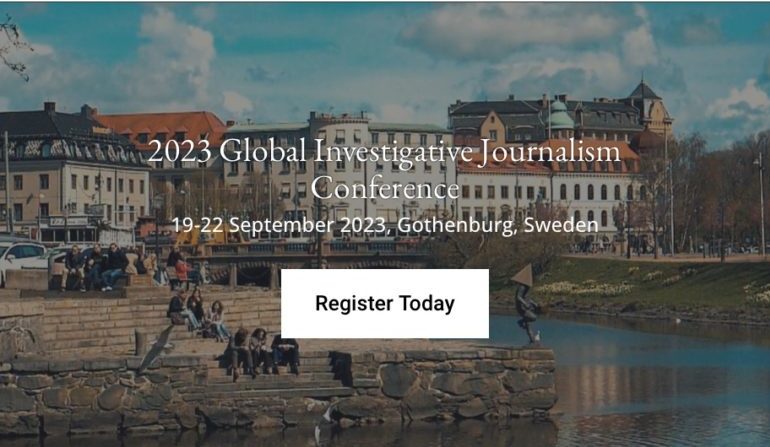
You probably already know why the Global Investigative Journalism Conference (#GIJC23) is a big deal. These biennial events are the largest international gathering of watchdog journalists, and they’re among the rallying points, and recharging stations, for accountability as democratic norms and institutions crumble around the world. They’re a big deal for watchdog newsrooms, because the tools, sustainability strategies, and story collaborations openly shared there help fill the gap left by declining resources, and add a layer of protection against autocrats and legal attacks.

Maria Ressa, CEO of Rappler in the Philippines and Nobel Peace Prize laureate, was the keynote speaker GIJC19. Image: Nick Jaussi.
Heck, the stakes for investigative journalists are now recognized as so enormous that our keynote speaker at GIJC19, in Hamburg — Maria Ressa — was co-awarded the Nobel Peace Prize two years later.
But why is attending the next in-person conference — #GIJC23 in Sweden, this September — important for individual reporters? We expect this year’s Global Conference to be our biggest-ever, with 150 technique-focused panels, practical workshops, and networking sessions, attended by some 2,000 watchdog journalists from 100 countries. It takes place at a world-class, environmentally friendly venue in the historic, tree-lined city of Gothenburg. Why should you lobby, harangue, or flat-out beg your editor to get there? Here are eight reasons you really should join us:
1. Find Great New Stories
Some of the biggest collaborative projects in journalism began at past GIJCs. This is the place to come for partners, brainstorming, and collaboration. You’ll also find stories directly transferable to other countries. Do former residents of your old military bases have high rates of cancer? — find out how an AP team exposed the health effects of chemical dumping at a US Army base. Are your country’s deforestation and forest fires caused by government-connected contractors? Might private companies be peddling sanctions-busting documents and smuggling routes, as reporters recently found in Belarus and Kazakhstan? In our globalized world, investigations are just waiting to be done — and we’ll give you proven techniques to make them work. Come to Gothenburg, and pick the stories to take home.
2. Update Your Reporting Toolkit
Few of us fully realize the power of free, open source tools, and databases to provide direct evidence of wrongdoing, at almost any place around the world. To discover their deeper applications — right on your laptop — is hugely empowering, and, frankly, cool. At the most basic level, for instance: after an incident on the street, you can zoom in on Google Maps to get phone numbers for nearby store managers to request CCTV imagery. Easier still: you can click on the “What’s Here” tab to get the coordinates of the incident, and then paste it into Tweetdeck, with the word “geocode:” and a radius, to get all the social media information coming in from that point. (This is how some reporters gathered evidence on the violent insurrection at the US Capitol on January 6, 2021.) At GIJC23, the world’s leading online reporting experts will share free, easy-to-use basic techniques like these, as well as advanced methods, for tools and sensors to uncover everything from deforestation to war crimes to confidential phone numbers — digital search “tricks” you simply need to know.
3. Learn New, Practical Investigative Techniques
One clear takeaway from past GIJCs is that there tends to be a pattern to how bad actors behave, and a combination of tools to prove what they did. For instance, in 2022, the visual forensics team at The New York Times realized that the same people who had executed Ukrainian men in Bucha had also stolen their smartphones to take selfies, and then made free calls back home to Russia. The Times used online tools and social media accounts to identify their unit. At GIJC21, a Liberian reporter explained how undeclared assets owned, and hidden, by politicians might be unwittingly highlighted by their spouses on social media. This human-nature-plus-tools combination represents the kind of technique that experts at GIJCs routinely describe in detail — and they can form a practical methodology for any reporter investigating similar issues.
4. Network on a Global Scale
GIJC23 is an opportunity for growth professionally and personally. Ask a journalist who’s been to a GIJC about their favorite part, and they’re likely to say it’s the people — those chance encounters in the hallways, at the elevators, in the bars. Add to this the fact that most of the 2,000 journalists and experts gathered there are “your people” — and likely keen to help you brainstorm how to access sources, documents, and the truth. Beyond those hallways, GIJC23 will involve a record number of networking and brainstorming sessions — by language, region, and topic — to collaborate and talk ideas in a relaxed setting. These are especially helpful for both editors and freelancers.
5. Get Hot-Off-the-Press GIJN Reporting Guides
 Here’s a chance to be on-hand for release of the latest authoritative guides from GIJN, with briefings on how to use the practical tools, databases, and insights within them — and even to collar their authors in the hallways. We’re working on cutting-edge guides on online search techniques, investigating war crimes, digging into disability issues, and a cyber-investigations manual. We’ll also be unveiling the latest multilingual versions of the Journalist Security Assessment Tool, GIJN’s acclaimed security self-test for newsrooms. And we’ll be following up on past guides to investigating organized crime; newsroom fact-checking; flight tracking; and citizen investigations.
Here’s a chance to be on-hand for release of the latest authoritative guides from GIJN, with briefings on how to use the practical tools, databases, and insights within them — and even to collar their authors in the hallways. We’re working on cutting-edge guides on online search techniques, investigating war crimes, digging into disability issues, and a cyber-investigations manual. We’ll also be unveiling the latest multilingual versions of the Journalist Security Assessment Tool, GIJN’s acclaimed security self-test for newsrooms. And we’ll be following up on past guides to investigating organized crime; newsroom fact-checking; flight tracking; and citizen investigations.
6. Learn About the Latest Legal, Security, and Disinformation Threats
Sadly, you, as a watchdog reporter, are a likely target of powerful bad actors. GIJC23 is the ultimate event to learn the scope and scale of the latest threats facing investigative journalists, from disinformation and harassment “SLAPP” lawsuits to state persecution and surveillance threats. At GIJC23, experts will share critical techniques for keeping yourself, your sources, and your data secure, and for detecting attacks and surveillance. We’ll have tech experts on hand to check your phones and laptops for spyware. And we’ll share methods for exposing the people behind trolling, disinformation, and surveillance.
7. Be Trained by the Best in the Business
GIJCs — designed by journalists for journalists — are famous for their focus on practical, advanced reporting techniques. Our line-up of speakers will feature winners of the Pulitzer and Europe Press prizes, pioneers of data journalism, and fearless investigators who have exposed corruption and abuses of power almost everywhere. We’ll have experts on following the money, online searching, cross-border reporting, satellite imagery, and more.
How valuable is the training offered by the GIJC? After our last conference, we asked attendees if they would attend another GIJC: 99.3% said yes. Asked if they found GIJC21 useful, 98% said yes. And 91% said that GIJN had increased their capacity as journalists. Not bad, but there’s more…
8. It’s a Blast
GIJCs are serious training conferences, but we party hard, too. Join us for drinks at our welcome reception with journalists from 100 countries. Come dance to GIJN’s own blues band, The Muckrakers. Meet colleagues from around the world at a dozen networking sessions and at the conference hotel’s six bars and restaurants. See some remarkable reporting showcased at the Global Shining Light Awards. And put on your dancing shoes again for our closing night party.
To summarize: attending GIJC23 directly adds to your digging power, your inventory of impactful, doable story ideas, and — importantly — your motivation to tackle tough topics in the public interest. Thousands of past attendees agree that these events are enormously energizing and, well, fun.
The conference fee includes full access to all sessions and networking events, as well as lunches, receptions, and a gala dinner. (Bear in mind that attendees must be professional journalists or an employee of an organization that supports investigative or data journalism. For questions about eligibility, send queries to GIJC23@gijn.org.) Discounted “early bird” tickets of US$330 for individuals, and $400 for organizations, are available through March 31 (these tickets will be $380, and $500, respectively, thereafter). Use the easy registration link on this page.
We are also offering 200 fellowships to GIJC23, which cover round-trip flights to Gothenburg, the registration fee, a hotel stay, and other costs. These are offered to professional watchdog journalists with a working knowledge of English from developing or transitioning countries. The deadline for applications is February 28.
If you or your editor has further questions, check out our conference website, or contact gijc23@gijn.org for any other every query.
News organizations — if you’re interested in becoming a co-sponsor, drop us a line. You’ll be in good company.
We hope you can make it. This will be a gathering to remember!
Additional Resources
The 2023 Global Investigative Journalism Conference
Global Investigative Journalism Conference Moves to Gothenburg, Sweden, Sept. 19-22, 2023